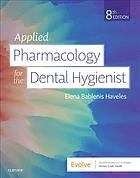
Applied pharmacology for the dental hygienist PDF
Preview Applied pharmacology for the dental hygienist
Applied Pharmacology for the Dental Hygienist EIGHTH EDITION Elena Bablenis Haveles, BS Pharmacy, PharmD, RPh Adjunct Associate Professor of Pharmacology, Gene W. Hirschfeld School of Dental Hygiene, College of Health Sciences, Old Dominion University, Norfolk, Virginia 2 Table of Contents Cover image Title page Copyright Reviewers Dedication Preface Intended audience Importance to the profession Organization Key features Ancillaries Acknowledgments 3 How to Be Successful in Pharmacology Use of objectives to focus studying Part I: General Principles 1: Information, Sources, Regulatory Agencies, Drug Legislation, and Prescription Writing History Role of the dental hygienist Sources of information Drug names Federal regulations and regulatory agencies Clinical evaluation of a new drug Drug legislation Prescription writing Dental hygiene considerations Academic skills assessment Clinical applications 2: Drug Action and Handling Characterization of drug action Mechanism of action of drugs Pharmacokinetics 4 Clinical pharmacokinetics Factors that alter drug effects Routes of administration and dose forms Dental hygiene considerations Academic skills assessment Clinical case study 3: Adverse Reactions Definitions and classifications Clinical manifestations of adverse reactions Toxicologic evaluation of drugs Recognizing adverse drug effects Dental hygiene considerations Academic skills assessment Clinical case study Part II: Drugs Used in Dentistry 4: Autonomic Drugs Autonomic nervous system Parasympathetic autonomic nervous system Sympathetic autonomic nervous system Dental hygiene considerations 5 Academic skills assessment Clinical case study 5: Nonopioid (Nonnarcotic) Analgesics Pain Classification Salicylates Nonsteroidal antiinflammatory drugs Acetaminophen Drugs used to treat gout Drugs used to treat arthritis Dental hygiene considerations Academic skills assessment Clinical case study 6: Opioid (Narcotic) Analgesics and Antagonists History Classification Mechanism of action Pharmacokinetics Pharmacologic effects Adverse reactions 6 Specific opioids Dental use of opioids Chronic dental pain and opioid use Dental hygiene considerations Academic skills assessment Clinical case studies 7: Antiinfective Agents Dental infection “evolution” Definitions Infection Resistance Indications for antimicrobial agents General adverse reactions and disadvantages associated with antiinfective agents Penicillins Cephalosporins Macrolides Tetracyclines Clindamycin Metronidazole Rational use of antiinfective agents in dentistry 7 Antimicrobial agents for nondental use Antituberculosis agents Topical antibiotics Antibiotic prophylaxis used in dentistry Dental hygiene considerations Academic skills assessment Clinical case study 8: Antifungal and Antiviral Agents Antifungal agents Antiviral agents Dental hygiene considerations Academic skills assessment Clinical case study 9: Local Anesthetics History Ideal local anesthetic Chemistry Mechanism of action Pharmacokinetics Pharmacologic effects 8 Adverse reactions Composition of local anesthetic solutions Local anesthetic agents Vasoconstrictors Choice of local anesthetic Topical anesthetics Doses of local anesthetic and vasoconstrictor Dental hygiene considerations Academic skills assessment Clinical case study 10: General Anesthetics History Mechanism of action Adverse reactions General anesthetics Balanced general anesthesia Dental hygiene considerations Academic skills assessment Clinical case study 11: Antianxiety Agents 9 Definitions Benzodiazepines Mechanism of action Barbiturates Nonbenzodiazepine-nonbarbiturate sedative-hypnotics Nonbenzodiazepine Receptor Hypnotics Melatonin receptor agonist Melatonin Orexin receptor antagonist Centrally acting muscle relaxants Miscellaneous agents General comments about antianxiety agents Dental hygiene considerations Academic skills assessment Clinical case study Part III: Drugs That May Alter Dental Treatment 12: Drugs for the Treatment of Cardiovascular Diseases Dental implications of cardiovascular disease Heart failure Angiotensin II receptor neprilysin inhibitor 10
